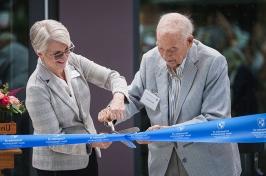
UNH will lead a new $6 million project to design and apply Nature-based Solutions (NBS) — strategies that mimic or enhance natural ecosystem processes — for climate resilience. Photo credit: Adobe Stock
Extreme weather events caused by climate change pose risks to everyone, but low-income and marginalized communities that lack the resources to improve living conditions suffer disproportionately. A new $6 million project led by the University of New Hampshire will create a three-state partnership to design and apply Nature-based Solutions (NBS) — strategies that mimic or enhance natural ecosystem processes — for climate resilience. Manchester will be the site of one of the projects’ hubs for designing and implementing NBS.
Called Equitable Nature-based Climate Solutions (ENACTS), the project will focus on three common types of NBS — tree programs, public parks and stormwater control — in medium-sized cities with vulnerable populations who suffer from climate-related flooding and heat island problems.
In Manchester, one of ENACTS’ three distinct “living hubs,” researchers will train local community ambassadors, working closely with them to recruit participants for meetings at which they will help to inform and shape the design and implementation of socially equitable NBS for their communities. Other ENACTS hubs are in Rhode Island and Kentucky.
Led by associate professor of civil and environmental engineering Weiwei Mo, ENACTS is a four-year project supported by an EPSCoR award from the National Science Foundation. In addition to Mo, Semra Aytur, professor of health management and policy, and Fei Han, assistant professor of civil and environmental engineering, are researchers on the project. Also involved from UNH are UNH Stormwater Center Director James Houle and the UNH Sustainability Institute. Partner universities include the University of Rhode Island, the University of Louisville, Antioch University of New England and the Rhode Island School of Design.
-
Written By:
Denise Blaha | NH EPSCoR | denise.blaha@electronic-fittings.com






















































